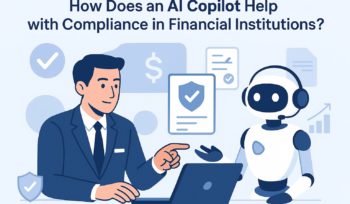How Does an AI Copilot Help with Compliance in Financial Institutions?
- September 8, 2025
- Posted by: Gradeon
- Category: Compliance

In today’s fast-paced financial sector, regulatory compliance has become increasingly complex. Financial institutions must adhere to stringent frameworks like PCI DSS and DORA while managing large volumes of sensitive customer data. Traditional manual processes can no longer keep up with the pace and precision required.
This is where AI co-pilots step in. Acting as intelligent assistants, they help financial institutions automate compliance processes, reduce risks, and enhance security. By integrating advanced technologies like machine learning and predictive analytics, AI co-pilots are transforming compliance management and enabling financial organisations to stay ahead in a highly regulated landscape.
What Is an AI Copilot in Compliance?
An AI co-pilot is an intelligent virtual assistant designed to support IT and compliance teams. Instead of replacing human expertise, it augments capabilities by automating routine tasks, analysing vast datasets, and providing real-time insights.
For financial institutions, AI co-pilots can monitor compliance frameworks continuously, automate evidence collection for audits, flag vulnerabilities in real time, and assist with incident response and regulatory reporting.
Challenges Financial Institutions Face in Compliance
Compliance within financial services is highly demanding. With frameworks such as PCI DSS (for payment security) and DORA (for digital operational resilience), institutions must ensure robust data protection, secure IT infrastructure, and detailed audit readiness.
Here are some common challenges:
- Increasingly complex regulations — Keeping up with evolving compliance standards is time-consuming.
- Manual reporting inefficiencies — Traditional evidence collection and reporting slow down audits.
- Data security concerns — Financial institutions are prime targets for cyberattacks, making compliance even more critical.
- High costs of non-compliance — Fines, reputational damage, and operational disruption can be devastating.
AI co-pilots provide automation and intelligence to address these challenges effectively.
Key Benefits of Using an AI Copilot for Compliance
1. Real-Time Monitoring and Risk Detection
AI copilots continuously monitor systems and networks to detect anomalies or non-compliance risks. This proactive approach allows institutions to address issues before they escalate into costly breaches or penalties.
2. Streamlined Regulatory Reporting
Generating compliance reports for frameworks like PCI DSS or DORA can be time-consuming. AI copilots automate this process, reducing manual effort and ensuring reports are accurate and audit-ready.
3. Enhanced Cybersecurity and Data Protection
Compliance and security go hand in hand. By integrating AI copilots with cybersecurity measures, financial institutions can detect threats faster, ensure data privacy, and meet regulatory security standards effortlessly.
4. Simplified Governance and Evidence Collection
Collecting evidence for audits and regulatory checks often consumes significant resources. AI copilots automate evidence gathering, helping organisations stay prepared for compliance audits without disrupting operations.
Why Financial Institutions Should Embrace AI for Compliance
As regulatory requirements continue to evolve, relying solely on manual processes is no longer sustainable. AI copilots offer a smarter, faster, and more efficient way to manage compliance while strengthening cybersecurity and reducing operational risks.
For financial institutions looking to stay ahead, adopting AI-powered compliance solutions is no longer optional — it’s essential.
AI Co-Pilots in Cybersecurity for Financial Institutions
Compliance goes hand in hand with cybersecurity. Financial institutions manage sensitive customer and payment data, making them attractive targets for cybercriminals. AI co-pilots strengthen security by:
- Detecting Anomalies: Analysing user behaviour to spot unusual patterns that may indicate fraud or insider threats.
- Automating Threat Response: Containing potential breaches instantly to prevent data loss.
- Providing Predictive Insights: Using advanced analytics to anticipate emerging threats and prepare proactive defences.
Gradeon’s cybersecurity consultancy services complement these capabilities by aligning AI-driven defences with regulatory requirements, ensuring financial organisations remain both secure and compliant.
Automating Audit Processes and Evidence Collection
Audit preparation is one of the most time-intensive parts of compliance. Gathering logs, reports, and other evidence manually often results in delays and errors.
AI co-pilots make this process seamless by:
- Centralising Data Collection: Automatically aggregating compliance-related data from multiple systems.
- Ensuring Real-Time Accuracy: Providing up-to-date reports ready for auditors at any time.
- Reducing Manual Effort: Freeing compliance teams to focus on strategic planning rather than administrative tasks.
By integrating AI with compliance workflows, financial institutions can cut down audit preparation time by up to 60%.
The Human-AI Collaboration in Compliance
AI co-pilots aren’t here to replace compliance officers or IT teams. Instead, they empower professionals to make better decisions and focus on strategic initiatives.
For example:
- Compliance teams spend less time chasing paperwork and more time improving frameworks.
- Security analysts can concentrate on advanced threat intelligence rather than routine monitoring.
- IT leaders gain a complete view of operational resilience, enabling proactive management.
This human-AI synergy ensures financial institutions stay agile, secure, and compliant.
Why Financial Institutions Should Act Now
The financial sector is undergoing rapid transformation, and regulatory demands will only grow more complex. Organisations that leverage AI co-pilots today will be better equipped to:
- Meet PCI DSS and DORA compliance standards effortlessly
- Reduce cybersecurity risks and operational vulnerabilities
- Streamline audit processes and evidence management
- Enhance customer trust by securing sensitive data
At Gradeon, we help financial institutions integrate AI-driven compliance solutions that align with evolving regulations and industry best practices.
Final Thoughts
For financial institutions, compliance is no longer just a checkbox exercise — it’s a strategic imperative. AI co-pilots are revolutionising how organisations manage compliance, secure data, and build operational resilience.
By adopting these intelligent assistants alongside expert consultancy, financial institutions can stay compliant, mitigate risks, and gain a competitive edge in an increasingly regulated landscape. To explore more about the role of AI co-pilots in IT operations, this detailed guide provides deeper insights into how AI is transforming modern IT processes.

